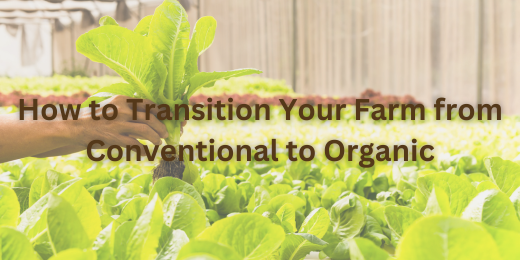
How to Transition Your Farm from Conventional to Organic
Transitioning to organic farming
Understanding Organic Farming Principles
Transitioning to organic farming promotes health and sustainability, benefiting both the environment and human well-being. This shift aligns with core values focused on ecological balance, fostering a natural relationship between land and crops. Organic methods nurture soil vitality, encouraging biodiversity and reducing dependence on harmful chemicals and artificial inputs.
Organic farming practices involve crop rotation techniques that improve soil health and ensure nutrient retention. By rotating crops strategically, farmers can preserve the ecosystem and reduce pest problems naturally. This approach promotes soil stability and fertility, creating a more resilient agricultural system over time.
Organic methods work to avoid synthetic inputs, replacing chemical treatments with natural alternatives to protect the land. These sustainable approaches reduce contamination risks and support healthier food production. Farmers adopting these practices contribute to a safer environment, cultivating crops in harmony with nature’s rhythms.
Evaluating Soil Health for Organic Readiness
Transitioning to organic farming requires careful evaluation of soil health, focusing on existing nutrients and overall fertility. Farmers should assess the soil’s composition to determine suitability for organic cultivation methods. This initial assessment guides future soil improvements, enabling sustainable and productive organic farming practices aligned with environmental needs.
Improving soil health involves introducing organic amendments to restore essential nutrients and balance. These amendments help rebuild soil structure and increase its ability to retain moisture effectively. Enriching soil with organic matter also promotes microbial activity, creating healthier conditions for robust plant growth over time.
Organic farmers often face challenges when managing depleted soils, which need additional care and resources. Converting such soils to meet organic standards can require prolonged treatment and strategic planning. However, organic farming practices ultimately lead to resilient, nutrient-rich soil, supporting sustainable agriculture and reducing environmental impacts.
Planning Crop Rotation and Biodiversity
A well-planned crop rotation system plays a critical role in maintaining soil fertility for organic farming. By rotating compatible crops, farmers can naturally replenish essential nutrients within the soil. This practice aids in creating a balanced growing environment, reducing dependency on synthetic inputs over time.
Integrating biodiversity within farming systems supports natural pest and disease control, enhancing resilience. Diverse plant species contribute to the ecological balance, encouraging beneficial organisms to flourish. Farmers adopting organic farming practices promote a self-sustaining ecosystem, reducing chemical interventions significantly.
Crop diversity provides multiple advantages, supporting a robust ecosystem essential for sustainable farming outcomes. Various crops work together to improve soil quality, promote pollination, and prevent disease. Transitioning to organic farming with diverse crops strengthens environmental stability, fostering long-term agricultural productivity and ecological health.
Implementing Natural Pest and Weed Control
Effective natural pest control methods in organic farming include traps, companion planting, and carefully chosen bio-pesticides. These methods help farmers manage pests without relying on harmful chemicals. Such techniques make organic farming practices more sustainable, ensuring long-term soil health and protecting biodiversity within the farming environment.
For effective weed management, methods like mulching, cover cropping, and hand-weeding are highly beneficial. Mulching suppresses weed growth while also helping retain soil moisture and improve fertility. Using these natural techniques supports farmers in transitioning to organic farming successfully, reducing reliance on synthetic herbicides and chemical weed management.
A balanced ecosystem is essential for protecting crops from pests in an organic setting. Maintaining natural pest-predator relationships reduces pest populations while supporting ecological stability. This approach not only safeguards crops but also contributes to a healthier and more sustainable agricultural environment.
Achieving Organic Certification Standards
Securing organic certification in South India requires following a series of well-defined steps and guidelines. These steps ensure that farms adhere to necessary organic farming practices for sustainable agriculture. Achieving certification not only builds trust with consumers but also enhances the farm’s reputation in the organic market.
Maintaining accurate records is essential for farms working toward organic certification compliance and credibility. Proper record-keeping includes tracking crop rotations, input applications, and other transitioning to organic farming methods. Consistent documentation supports the farm’s transparency, ensuring traceability of practices that meet organic standards effectively.
Periodic inspections and documentation play a crucial role in maintaining a farm’s organic status over time. These inspections verify compliance with certification requirements, offering valuable opportunities for continuous improvement. Meeting these standards reflects a farm’s commitment to quality, helping build lasting trust with consumers and supporting sustainable farming.
Marketing Your Organic Produce Effectively
Effective branding is essential to highlight a farm’s organic and sustainable efforts to appeal to conscious consumers. Clear labelling helps differentiate produce and showcases a commitment to organic farming practices. Branding that emphasises eco-friendly practices strengthens consumer trust, encouraging long-term loyalty in the competitive organic market.
Promoting organic produce through local markets and online platforms boosts reach across South India. Farmers’ markets offer direct consumer engagement, building relationships while fostering community support. Online channels expand visibility, allowing customers to easily access information about farms transitioning to organic farming.
Locally-sourced, organically-grown foods are increasingly popular, reflecting a shift towards healthier and eco-friendly options. Consumers seek assurance in product origin, focusing on sustainability and ethical farming. Highlighting organic benefits effectively addresses this demand, reinforcing the value of natural, wholesome produce for health-conscious individuals.
Uyir Organic Farmers Market exemplifies the core principles of transitioning to organic farming by providing eco-conscious, sustainably produced crops. Their commitment to organic farming practices supports biodiversity, soil health, and pesticide-free cultivation. Uyir Organic’s range of products reflects these values, giving consumers access to truly sustainable, nutritious, and locally-sourced produce. For more information, visit your nearest Uyir Organic Farmers Market or visit online www.uyironline.in or www.uyirorganic.farm.